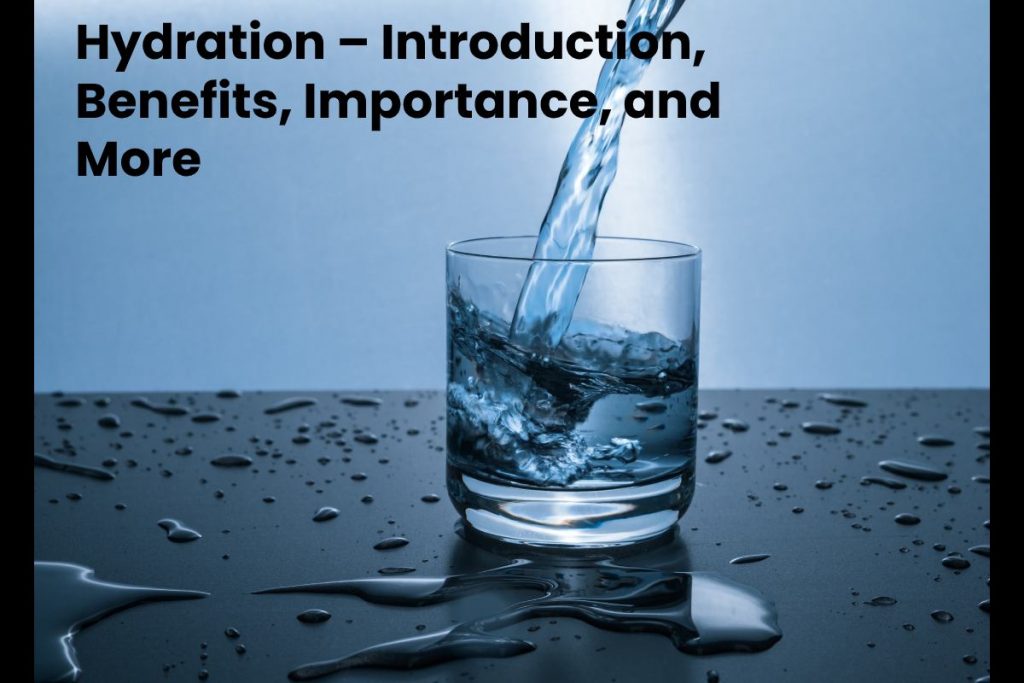Table of Contents
What is Hydration?
Hydration – Water is the main component of the body (about 65%) and is found in all parts of the body (organs, bones, blood, muscles, etc.)
Lean and muscular (and athletic) subjects need much more water than sedentary people because the muscles retain a lot of water with the glycogen stores they contain.
Yes, muscle contains much more water than fat or any organ (73% versus 10% for fat stores).
How do I know if I am Sufficiently Hydrated?
If you’re anything like us, you might already know the steps to staying properly hydrated, but how do you know if you’re doing it? Because recommendations for how much water to drink and symptoms of dehydration vary from person to person, it’s important to be able to gauge your hydration status beyond just what you’re drinking.
A simple test is to assess the color of your urine. Dark yellow to amber-colored urine can indicate dehydration, while pale yellow urine usually means you are well hydrated.
The Benefits of Hydration
Staying hydrated keeps you healthy. This is a recognized fact, known to all. What we may know less is how hydration guarantees our physiological balance. First of all, it eliminates toxic substances from the body. To eliminate them, the kidneys have to do their job by draining these wastes out of our body. So what is the best way? Drink water. In addition, hydration also helps regulate its temperature. It plays a main role in maintaining a constant temperature inside the body and even more so in case of fever.
Hydration – Beware of Dehydration
The hydric capital is subjected to a permanent adjustment according to the needs for the organization, and varies in a limited way. Not drinking enough can cause dehydration. It is commonly seen in children and the elderly. And, its consequences can be dramatic: in infants, weight loss by dehydration that reaches 10% requires emergency hospitalization.
Adopt the Right Gestures
Get children used to drinking water regularly.
Drink in small amounts several times during the day.
Remember to drink more when it’s hot, even if you’re not thirsty. Thirst is a late sign of dehydration.
Drink regularly baby, very sensitive to dehydration especially in case of high ambient temperature, diarrhea or fever.
Orders to Follow
1 – Don’t wait to be thirsty to drink, especially when it’s hot
2 – Drink plain water most often 2 hours before exercise
3 – Drink water every 10 to 15 minutes; two large sips of 100 to 200 ml
4 – Compensate for water loss by drinking water
5 – Drinking outside meals
6 – Beware of alcohol consumption
7 – Drink more at altitude, when it is cold or hot for the same effort
The Dangers of Severe Dehydration and Overhydration
Dehydration occurs when the body’s water supply is insufficient. Severe dehydration causes confusion or impaired consciousness. Confusion and impaired consciousness may appear in more severe forms corresponding to weight loss greater than 4%. Being very thirsty during exercise is a sign of dehydration.
Conversely, there are also risks in drinking a lot (too much) of water. This phenomenon is better known as hyperhydration. Overhydration is one of the real risks of practicing endurance sports and can even be fatal. Amateur athletes are often over-informed about the risk of dehydration and think they are doing the right thing by following the recommendations and drinking (too much) at all the aid stations. They then drink more than they have lost through perspiration, to the point of exceeding the renal regulation capacities which are limited during an effort.
How Important is Staying Hydrated to your Overall Health?
Did you know that the human body is made up of approximately 60% water? Every day, we need water to live, feel good and function at our best. However, it’s a good idea to examine the effects of dehydration to help you understand why being well hydrated is so important.
Dehydration can occur when we lose more body fluids than we consume. This can happen due to bodily functions that cause a loss of fluids and electrolytes, such as
Diarrhea and vomiting: When diarrhea is sudden and severe, your body can lose fluids and electrolytes quickly and in large amounts.
Sweating: When you sweat, you lose water, so the more you sweat, the more likely you are to become dehydrated quickly.
Dehydration takes on a whole new aspect when you’re sick, as common symptoms like fever, diarrhea, vomiting, and loss of appetite can all lead to dehydration. If you don’t drink enough fluids, your body may have trouble regulating its temperature. Even a small loss of fluid can contribute to a higher body temperature.
Your body needs to be well hydrated to maintain important functions, such as:
- Regulate body temperature
- Maintain healthy skin and joints
- digest food
- Helping the brain function at its best
- Produce necessary bodily fluids, such as tears and saliva, and eliminate waste through sweat, urine, and stool.
If you are sick with a virus, adequate hydration can help the skin and mucous membranes act as a barrier to prevent bacteria from entering the body. By staying well hydrated, you can also reduce nasal irritation when you cough, sneeze, and even breathe normally.
Conclusion
Water is the most significant constituent of the human body. On average, water makes up 60% of our total body weight and 83% of our blood. Nearly 2/3 are present inside our cells, and 1/3 outside.
Water is essential for the maintenance of several functions such as the transport of nutrients and hormones, and the elimination of waste produced by our cells. It dissipates excess body heat by evaporating it from the surface of the skin.
